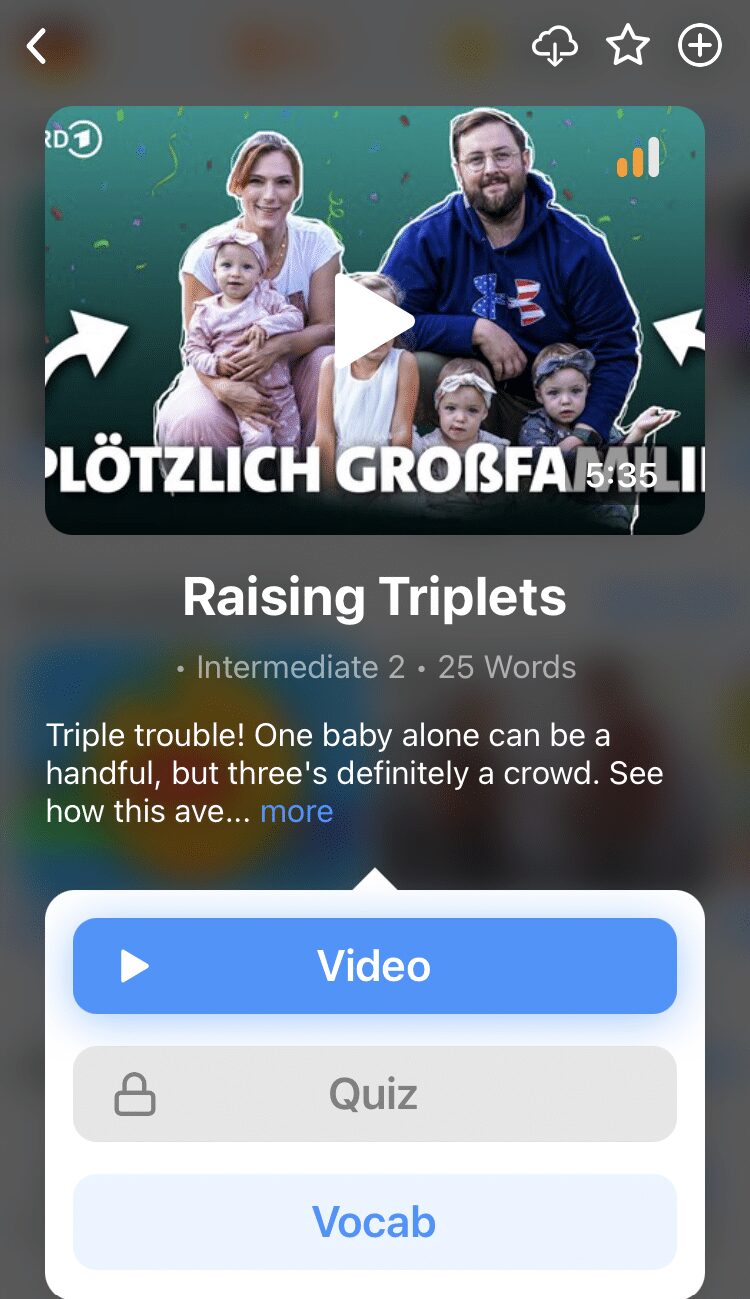Contents
How to Say “You” in German

Unlike English, German has three different ways to say “you.” How do you know which ones to use? It depends on the situation and who you’re talking to.
Mastering these pronouns is crucial, since they indicate the level of formality and respect you intend to convey.
In this blog post, I’ll show you the various ways to say “you” in German: du, ihr and Sie, and explain when they’re used.
Download: This blog post is available as a convenient and portable PDF that you can take anywhere. Click here to get a copy. (Download)
3 Ways to Say “You” in German
In German, there are three ways to say “you”: du , Sie and ihr .
- Du is used when talking to one person in informal situations, such as a friend or family member.
- Ihr is also informal, but is used for more than one person, similar to “you all” or “y’all”.
- Sie is the formal way to address someone, commonly used in professional or respectful settings. This is used for just one person as well as groups of people.
When in doubt, especially in more formal or professional settings, it’s often safer to use the formal Sie until a more familiar tone is established.
So when choosing which pronoun to use, you need to think about your level of familiarity with the person or people you’re addressing and whether you’re talking to just one person or multiple people.
How to Use the 3 Forms of “You” in German
How and When to Use du
Du is the informal singular form of addressing someone. It’s used when speaking to a friend, family member, person of the same age group, child or someone with whom you have a close and familiar relationship.
In casual or informal settings, like at a party or a social gathering, using du with everyone would be appropriate.
If you have a close and friendly relationship with your colleagues, or even just a casual work environment, you might also use du in the workplace.
When using du you need to conjugate your verbs accordingly, so be sure to use the du form of the verb. In the present tense, this means an -st ending:
Du kommst, du siehst, du siegst. (You come, you see, you conquer.)
Here are some more examples of using du:
Hast du Hunger? (Are you hungry?)
Hast du Lust, heute Abend auszugehen? (Do you feel like going out tonight?)
Kannst du mir kurz helfen? (Can you help me quickly?)
If you’re unsure, there’s a specific verb you can use to ask if someone would be okay with using the informal “you”:
Können wir uns duzen? (Can we use du with each other?)
How and When to Use ihr
So, du is just for when talking to one person informally.
But what if you’re texting a couple of pals to see if they want to grab brunch; asking several family members at thanksgiving if they want extra gravy; telling the whole cast of your thespian peers at college that you just loved their three-hour musical epic?
Well, that’s where ihr comes in. It’s exactly the same as du in terms of informality. The only difference is in the number—if you’re talking to more than one person, use ihr.
This difference is very much not an optional thing you can ignore—if you use du with a group of people, it will sound very odd, and might even invite confusion as to who you’re talking to. It can help to not think of ihr as “you,” but rather roll out some southern flair and think of it as translating to an informal “y’all.” This way, you’re less likely to get confused. Yeehaw!
Just as with du, the main thing to focus on is getting your verb conjugations right. Ihr has its own conjugation pattern in the present tense, usually ending in -t and ignoring any of those pesky vowel changes so common in the du form:
Ihr lebt, ihr lacht, ihr liebt. (Y’all live, y’all laugh, y’all love.)
Here are some more examples:
Was macht ihr heute Abend? (What are y’all doing tonight?)
Könnt ihr mir beim Umzug helfen? (Can you guys help me with moving?)
Habt ihr Lust, am Samstag ins Kino zu gehen? (Do y’all fancy going to the movies on Saturday?)
Wie kommt ihr zur Party? (How are you guys getting to the party?)
The difference between Ihr and ihr
As discussed above, ihr is the informal “you” for a group of people.
But be careful not to unnecessarily capitalize it, as this creates a whole different meaning! Capitalized Ihr is the formal version of “your”:
Wir bitten um Ihr Verständis. (We ask for your understanding.)
So if you mean to say “you” informally to a group, unless it’s at the beginning of a sentence, you should never capitalize it:
Wo wohnt ihr? (What are y’all doing tonight?)
The word ihr is particularly tricky in German, as it can have even more meanings:
- Lower case ihr is the third person plural possessive pronoun— equivalent to “their.”
- The feminine third person singular possessive pronoun—equivalent to “her.”
- The feminine third person singular personal pronoun in the dative case, the German equivalent of “her” as an indirect object.
In one ihr and out the other? Don’t fret, we’ve got a whole article on the word ihr to set you right!
How and When to Use Sie
Sie in German serves as the formal equivalent of “you” in English. This form of address is characterized by its use in more formal or polite contexts, such as when interacting with strangers, elders or in professional settings.
When using the capitalized Sie as the formal pronoun, the accompanying verb is conjugated in the third person plural form, with an –en ending, like this:
Können Sie mir bitte helfen? (Can you please help me?)
Luckily, in the present tense, this is always the same as the infinitive (how you’ll find the verb in the dictionary) so no extra verb conjugations to learn here.
You can use Sie as both singular and plural, similar to “all of you” or “you all” when addressing a group of people in a formal context.
The choice between the informal du and the formal Sie depends on the level of familiarity and the social context, with Sie generally being the preferred and more respectful option in formal or professional interactions.
Basically, if you don’t know a person well, it’s best to err on the safe side and use Sie.
And if you’re really unsure, just as with du, there’s a specific verb you can use to ask:
Sollten wir den Chef siezen? (Should we use Sie with the boss?)
Wissen Sie, wo die Bibliothek ist? (Do you know where the library is?)
The difference between Sie and sie”
Just like with ihr and Ihr, you need to watch out for your capitals with Sie and sie.
The words might look the same, but they have two very different meanings:
- sie (pronoun, third person singular): This form of sie is a third person singular pronoun, meaning “she” in English.
For example: Ich habe sie gestern im Park gesehen. (I saw her in the park yesterday.)
- Sie (pronoun, formal second person, singular and plural): As we’ve seen above, when capitalized, Sie becomes the formal “you.” Look what happens to the meaning of our example sentence when we add a capital:
For example: Ich habe Sie gestern im Park gesehen. (I saw you (formal) in the park yesterday.)
What a difference a capital makes! Of course, when speaking, we can’t hear capitals, so you just have to use context to figure out which one is meant. Luckily, this is usually quite obvious.
In summary, sie without capitalization is “she,” while Sie with a capital “S” is the formal way to say “you” to both one person and groups.
How du, ihr and Sie Change in Different Cases
To get familiar with how they’re used, so far we’ve just looked at examples of each of these different “you”s in the nominative case.
But in German, pronouns like du, Sie and ihr change based on what they’re grammatically “doing” in the sentence. This is called what “case” they’re in, of which there are four—the nominative, accusative, dative and genitive.
Luckily, with pronouns, we only need to worry about the first three!
So if these pronouns are du, ihr and Sie in the nominative case, what about the accusative and dative? Let’s have a look at any changes below:
Accusative Case
- du → dich
Example: Ich liebe dich! (I love you!)
- ihr → euch
Example: Ich vermisse euch! (I miss y’all!)
- Sie → Sie (no change)
Example: Ich habe Sie heute Morgen angerufen, Herr Scholz. (I called you this morning, Mr Scholz.)
Dative Case
- du → dir
Example: Ich gebe dir meinen Schlüssel. (I’ll give you my key.)
- ihr → euch
Example: Ich koche euch was Leckeres! (I’m cooking something tasty for y’all!)
- Sie → Ihnen
Example: Ich helfe Ihnen gerne, Frau Müller! (I’ll gladly help you, Mrs Muller!)
Understanding these changes is crucial for constructing grammatically correct sentences in German and ensuring that the pronouns align with the respective cases in various contexts.
Hey you, you and you! You now know which form of German “you” to use in any situation, no matter who you’re talking to.
And One More Thing...
Want to know the key to learning German effectively?
It's using the right content and tools, like FluentU has to offer! Browse hundreds of videos, take endless quizzes and master the German language faster than you've ever imagine!
Watching a fun video, but having trouble understanding it? FluentU brings native videos within reach with interactive subtitles.
You can tap on any word to look it up instantly. Every definition has examples that have been written to help you understand how the word is used. If you see an interesting word you don't know, you can add it to a vocabulary list.
And FluentU isn't just for watching videos. It's a complete platform for learning. It's designed to effectively teach you all the vocabulary from any video. Swipe left or right to see more examples of the word you're on.
The best part is that FluentU keeps track of the vocabulary that you're learning, and gives you extra practice with difficult words. It'll even remind you when it’s time to review what you’ve learned.
Start using the FluentU website on your computer or tablet or, better yet, download the FluentU app from the iTunes or Google Play store. Click here to take advantage of our current sale! (Expires at the end of this month.)











